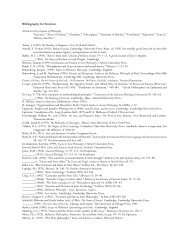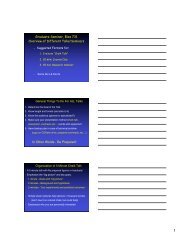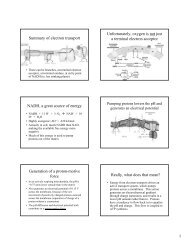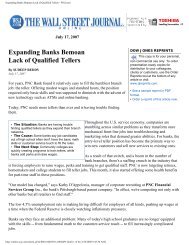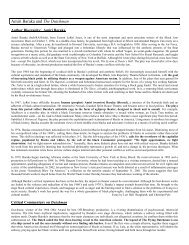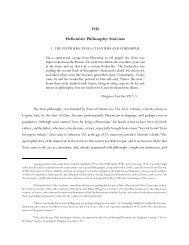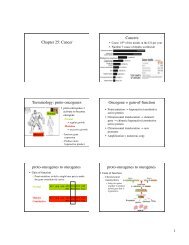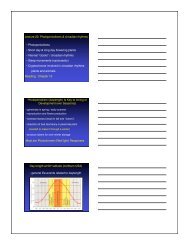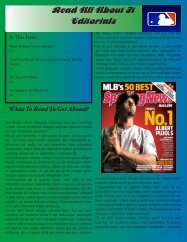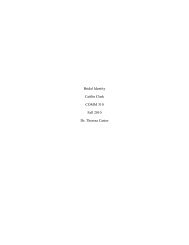V. VERB QUALITIES - UW-Parkside: Help for Personal Homepages
V. VERB QUALITIES - UW-Parkside: Help for Personal Homepages
V. VERB QUALITIES - UW-Parkside: Help for Personal Homepages
Create successful ePaper yourself
Turn your PDF publications into a flip-book with our unique Google optimized e-Paper software.
Exercise 5.01--The Flexible Indicative--The following sentences are<br />
all in the indicative mood. Identify those which nevertheless<br />
express commands or hypotheticals of one sort or another:<br />
1) You must go now, or my parents will catch us.<br />
2) If they should come home be<strong>for</strong>e you go, all hell will break<br />
loose.<br />
3) You can't leave your stuff on the floor like that.<br />
4) Will you please pick it up?<br />
5) Of course I wish you could stay.<br />
6) By the way, I may have some news <strong>for</strong> you later this week.<br />
7) I might be going to the doctor.<br />
8) How would you feel about getting married?<br />
9) I only meant we should be thinking about it.<br />
10) You should hurry.<br />
Like the imperative, the present subjunctive is expressed in modern English by using<br />
the base <strong>for</strong>m of the verb, particularly in place of the third person singular.<br />
English has retained a few vestiges of the subjunctive mood, mainly <strong>for</strong> use in <strong>for</strong>mal prose.<br />
The present subjunctive is expressed by using the base <strong>for</strong>m of the verb. When the base<br />
<strong>for</strong>m is used without a subject, however, it is always interpreted as imperative in mood. In<br />
addition, with the exception of be, normal English verbs (i.e., indicatives) already use the<br />
base <strong>for</strong>m <strong>for</strong> the present plural and the first and second person present singular. The<br />
subjunctive use of the base <strong>for</strong>m, there<strong>for</strong>e, is distinctive only in the third person singular of<br />
most regular verbs. Sentences (1) through (3) below show that the subjunctive can be used<br />
in that-clauses triggered by a verb (1), an adjective (2), or noun (3) respectively:<br />
(1) They proposed that he go to China.<br />
(2) It is advisable that he go to China.<br />
(3) The general gave an order that the sentry fire without asking <strong>for</strong> a<br />
password.<br />
Sentence (4) illustrates the subjunctive's use in certain old-fashioned <strong>for</strong>mulae. Conditional<br />
clauses like those in sentences (5) and (6) can also use the subjunctive:<br />
(4) Be that as it may, I am going.<br />
(5) If that be the case, I am a dead man.<br />
(6) We must take care lest we be seen as arrogant.<br />
In modern English, the past subjunctive is pretty much confined to uses of were when<br />
one would otherwise use was.<br />
Regular English verbs have no distinctive subjunctive <strong>for</strong>m in the past tense. For the verb<br />
be, the past subjective is <strong>for</strong>med by using the plural were where one would normally find the<br />
singular was–e.g., <strong>for</strong> the first or third person past singular. This subjunctive is used in<br />
conditional or hypothetical clauses or in clauses which follow certain verbs, like wish in<br />
sentence (10):<br />
(8) If I were a rich man, I wouldn't have to sing this song.<br />
(9) He acted as though he were offended.<br />
(10) I wish this class were over.<br />
112



